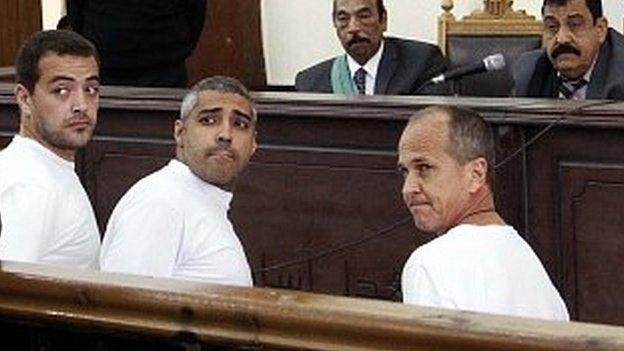Amal Clooney's dilemma over al-Jazeera trial
- Published
Al-Jazeera trial: Amal Clooney urges pardon for journalists
In a packed Cairo courtroom, a nervous quiet reigned on Saturday as Judge Hassan Farid read his long delayed verdict in the retrial of three al-Jazeera journalists.
Then, there was a stunned silence shattered by the sobbing of Marwa Omara, as she learned that the defendants, including her husband Mohamed Fahmy, were about to return to jail convicted on charges ranging from broadcasting "false news" to operating from a local hotel without a licence.
As a media forest of cameras and microphones turned towards Marwa who slumped down, head in hands, they also caught in their glare the British-Lebanese barrister Amal Clooney placing a comforting arm around her.
It was the first move by the prominent human rights lawyer in the immediate wake of the controversial verdict condemned by human rights groups, as well as foreign governments including the UK and the US.
Then Ms Clooney was swallowed in a media scrum as she embarked on her next steps in a tough, highly politicised battle on behalf of her client, the Egyptian-born Canadian Mr Fahmy.
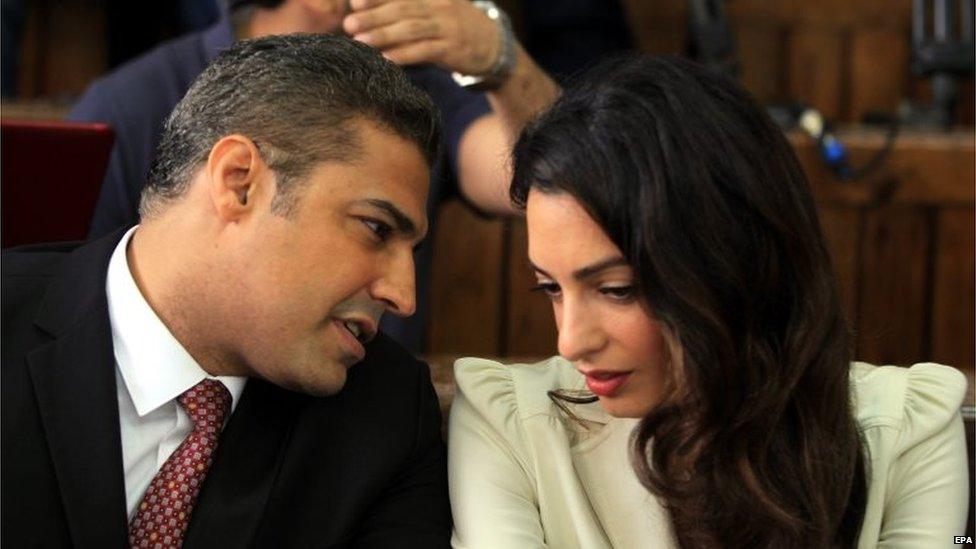
Mohamed Fahmy with Amal Clooney in court
"We have two avenues but the one we are pushing for the most is for President Sisi to issue a pardon," she tells me in a rare interview in Cairo, away from the crowds.
"To issue a pardon would mean the conviction is reversed and it would apply to all journalists not just those who are foreign," she explains.
'Terrible dilemma'
Amal Clooney's comment underlines a terrible dilemma.
The second avenue - a deportation law introduced last year by President Abdul Fattah al-Sisi's government - would allow her client Mr Fahmy to seek recourse to leave Egypt using his Canadian passport in the same way his co-accused journalist Peter Greste was sent home in February to Australia.
But that would leave their Egyptian colleague Baher Mohamed to serve the three year sentence and his additional six months of hard labour for possessing a spent bullet casing.
One Egyptian official admitted that keeping only an Egyptian in jail was another sensitive aspect of a very tangled case.
Peter Greste: "To be sentenced to three years is just devastating"
Months ago President Sisi did tell the Egyptian press: "I wished they were deported right after they were arrested instead of getting put on trial."
He's also spoken of a possible pardon once "the trial's session have finished".
But with an appeal on the cards by al-Jazeera's lawyers, this two-year-long saga could still drag on - and any talk of a pardon could be lost in legal wrangling. And so the question is whether President Sisi would still want to intervene and, if so, when.
Amal Clooney insists the President stepped in before and can do so again:
"There was a break in the proceedings when Peter Greste was deported and that was considered sufficient then to allow the executive to intervene," she tells me.
The Canadian government, accused earlier of not doing enough to support Mr Fahmy, has now formally applied for his pardon and/or deportation. He had reluctantly relinquished his Egyptian passport after assurances he would be sent out of the country at about the same time as Mr Greste.
"It's ironic that the charge here, the conviction, was for tarnishing Egypt's reputation when the thing that the international community condemns Egypt for is this case and similar cases," Ms Clooney remarks.
She points out that Egypt is now ranked by media watchdogs as the fourth highest country worldwide for the number of jailed journalists.
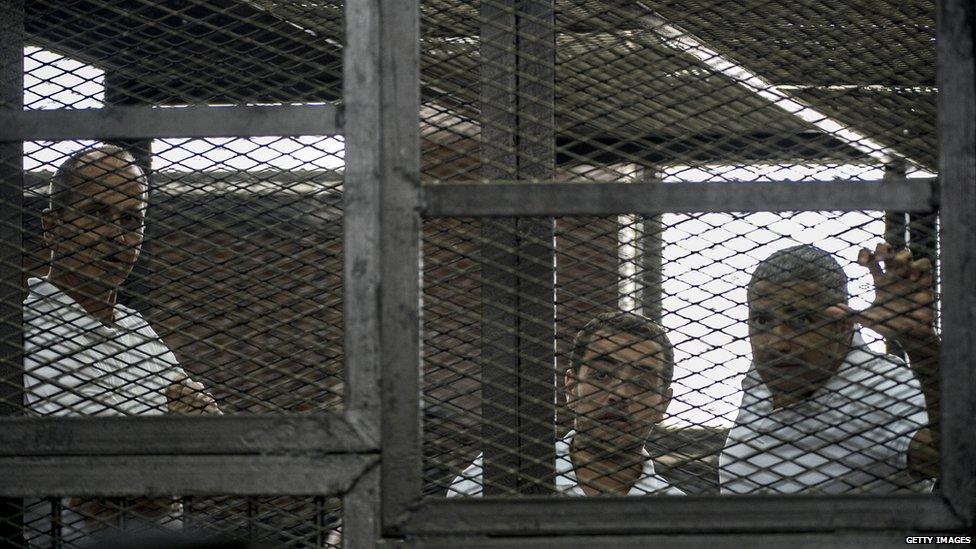
The three al-Jazeera journalists at their original trial
'Insulting the judiciary'
Egyptian officials repeatedly deny any media are detained for journalism, but for links to banned groups they accuse of terrorist activities, including the Muslim Brotherhood ousted from power two year ago.
The Foreign Ministry reacted swiftly and strongly to international condemnation of the verdict. Britain's Ambassador John Casson was summoned in Cairo over "unacceptable interference in the rulings of the Egyptian judiciary."
Ms Clooney also came under criticism in some Egyptian media for "insulting" the judiciary.
"I have more freedom to say what I have to say than lawyers who practise here all the time," she replies, expressing concern about the "very serious chilling effect" of some prosecutions.
Ms Clooney has been making headlines of late for taking on hard political cases ranging from Turkish denials of the Armenian genocide to a bid to save the lives of Libya's Saif al-Islam Gaddafi and former intelligence chief Abdullah al-Senussi who have been sentenced to death.
Now she is fighting a battle for a journalist and says what's at stake is also "much bigger than that".
- Published29 August 2015
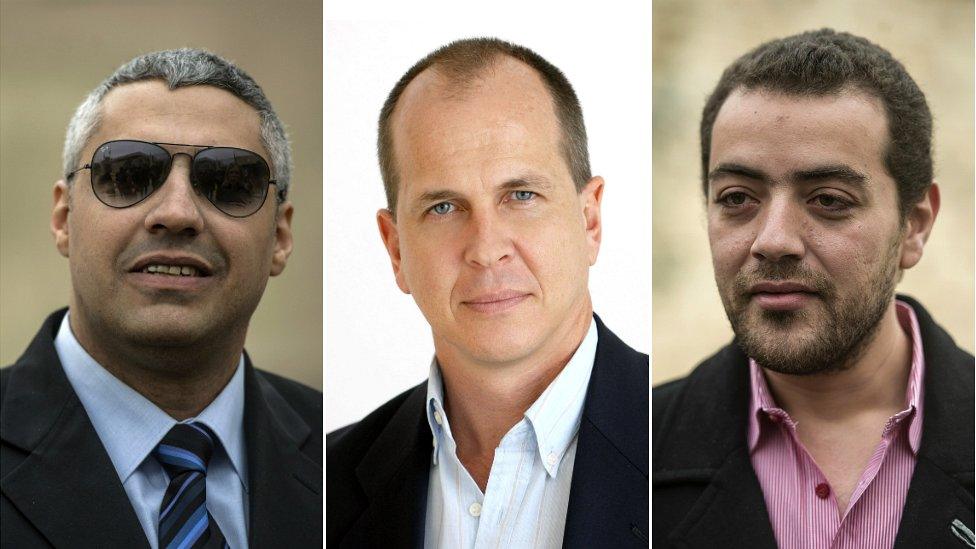
- Published29 August 2015
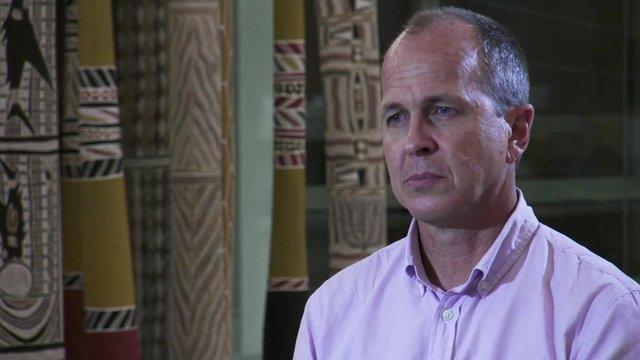
- Published13 February 2015
